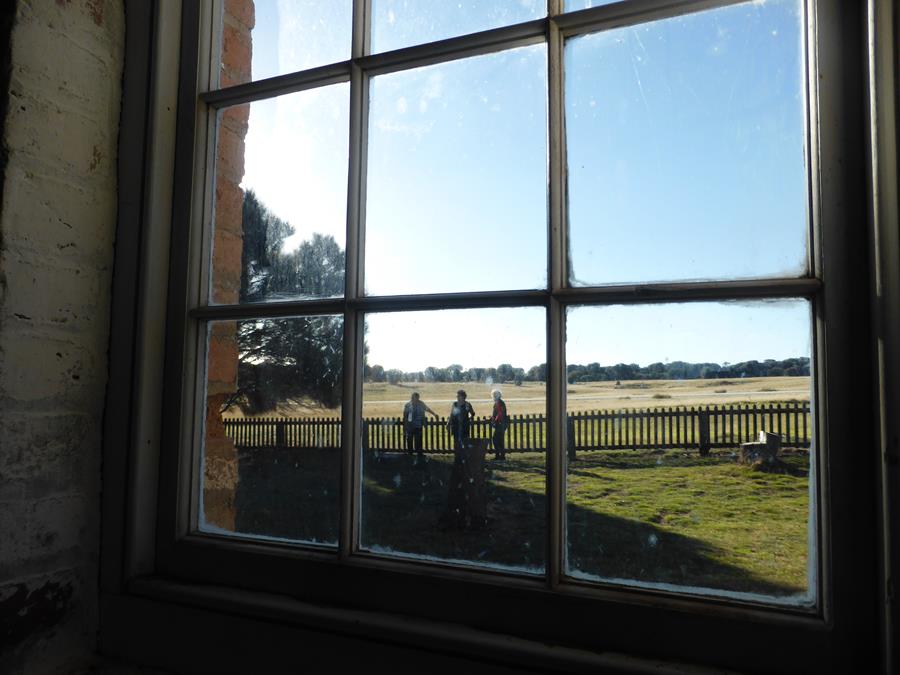Listening and learning on Country
June 1, 2018
Aboriginal elders recently took Anglicare CEO Chris Jones and two Aboriginal staff to visit Flinders Island.
“It was an honour to be taken on Country by members of Anglicare’s Aboriginal Advisory Group, yarnin up,” said Chris. “Driving in the minibus from one end of the island to the other gave plenty of opportunity for the sharing of family anecdotes and cultural meanings. It was a profound time”.
Aunty Verna Nichols and Delia Summers accompanied the group to a number of sites including Wybalenna – a place that is a stark reminder of what European colonisation meant for Aboriginal people. In the 1830’s, 300 Aboriginal people were removed from their homelands on the Tasmanian mainland and sent to Wybalenna. They were forced to live in poor conditions and many people became sick. Within a few years, most had died. The remaining 47 were sent to a settlement at Oyster Cove, south of Hobart.
Anglicare staff Jodie Jenkins and Jenelle Jennings said the visit to Wybalenna was a spiritual experience, particularly as it was the birth place of their ancestor, Fanny Cochrane Smith. “I think knowing who you are, your roots, where you’re connected to, is hugely important,” said Jenelle. “I just took my shoes and socks off and walked the land a bit to connect physically and spiritually”.
The cemetery at Wybalenna is a sacred place for the Tasmanian Aboriginal community. “It was pretty sad going to the cemetery knowing how many Aboriginal people were buried there but not having grave sites,” said Jodie.
Wybalenna was returned to the Aboriginal community in 1999.
The community says that without the continuous passing on of tunapri – knowledge and stories – the significance of Wybalenna could be lost, so encourages visitation.
“ I think Flinders Island is a pretty great example of our history and it’s important for people to be aware and have a recognition of some of the atrocities when it comes to places like Wybalenna and the massacres that were suffered by our people,” said Jenelle. “It’s good to be aware and to acknowledge and to recognise the ongoing struggle”.
During the three days on Flinders Island, the women visited a beach to learn about gathering shells for the traditional cultural activity of necklace-making.
“Having Aunty Verna teaching us how to look for shells, how to get your eye in, and sitting with us and identifying which shells are traditional shells used in necklace making, that was amazing,” said Jenelle.
Jodie said she was fascinated by the elders’ stories. “Coming here was just a real experience for me and I felt at ease,” she said. “I thought I’d be pretty nervous but it’s been really good. I do hope to return to Flinders Island and bring my own daughter. That’s something I will look forward to”.
Jodie said it was also wonderful to have Chris take part. “He is well respected by our community especially by our elders, so I think bringing him to Flinders Island to show him our beautiful Country shows how much respect we do have for him,” she said.
Chris said learning about Aboriginal culture was important to Anglicare, which values a strong relationship with the community and wants to provide effective services to Aboriginal people. As CEO, he meets regularly with the yarnin up group which has provided advice on a range of matters including cultural awareness training, protocols for Acknowledging Country and employing Aboriginal people.
“This was my second visit and it was a privilege to be invited to again spend time on Country with the elders,” he said. “They’ve been very generous in telling stories about what happened for them and their families. It was an additional joy to have Jodie and Jenelle there to hear those stories and wonderful to know that the community is seeking to increase opportunities for young Aboriginal people to visit Wybalenna”.

